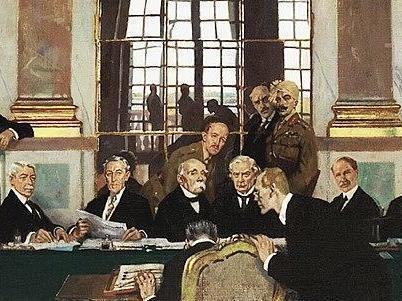Mea Culpa: what is the best known treaty signed in Louis XIV’s palace?
Errors and redundancies in last week’s Independent, compiled by John Rentoul


It is not usually my job to correct quizzes, but last week’s Saturday Quiz included the question: “Where have there been seven treaties signed, the first in 1756 and the last, most famously, in 1871?” The answer was given as Versailles, in which case the best-known date must be the eighth treaty in 1919. Thanks to Mick O’Hare for appealing to the referee.
However, this was the only time last week when we might have been justified – if we had got the answer right – in using the word “famously”. We used it several other times when it was redundant.
We said: “Jose Mourinho’s Roma were famously humbled 6-1 at the 8,300-capacity Aspmyra Stadium last year.” We said that Charlotte Bronte had “famously” written something about her younger sister. We described General George Custer as “the famously doomed US cavalry commander”. And we said: “Ms Truss famously described the abolition of the 45p rate as ‘a decision the chancellor made’.”
In fact, the word was worse than redundant, because it told the reader that they ought to have heard of something and therefore implied that they are ignorant if they have not. We could have deleted it with advantage on each occasion.
Humdrum folk: The headline on an editorial last week was: “Ordinary people are paying the price for this government’s economic incompetence.” That phrase, “ordinary people”, carries an air of condescension – implying that the people we are talking about are far away and not very interesting.
The headline was a fair reflection of the article, which concluded by condemning the government’s unforced errors and saying: “The crying shame is that ordinary people are having to pay the price.” In both the article and the headline we could have said something like “everyone is having to pay the price”.
Funny peculiar: In our birthdays column on Tuesday, along with Sir Bobby Charlton, “former footballer”, and John Nettles, “actor”, we listed Dawn French, “actor and comedienne”. What, asked Gavin Turner. He was right to be surprised. We try to avoid gendered job descriptions, and we managed not to call her an actress, so our style is to call her a comedian.
No more: We quoted someone in a headline as saying: “I do not have faith in the justice system anymore.” Thank you to Susan Alexander for pointing out that this should have been “any more”. Language evolves, and one of the commonest shifts is for words that are often used together to merge into one, sometimes with a transitional hyphenated phase. Single words such as “always” and “together” used to be two, and no doubt “any more” will go that way eventually. The change is “under way”, which is also usually two words in British English, but for the time being we should abide by the convention.
Me, myself and I: We often get these muddled. There are two simple rules for the writers of personal articles. One is to put yourself last, so it should be “they were rude to my friends and me” rather than “to me and my friends”. This is not just politeness; it helps to avoid awkward sentences such as “myself and my friends were upset”. The other is to check how it reads without the other people: so “Alma and I went for a walk” rather than “Alma and me” because “I went for a walk” sounds right and “me went for a walk” does not.



Join our commenting forum
Join thought-provoking conversations, follow other Independent readers and see their replies
Comments